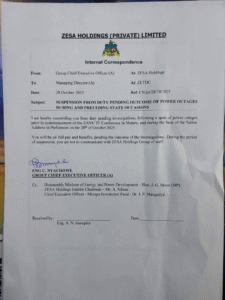CHOLERA CRISIS IN HARARE: A Looming Public Health Catastrophe

The cholera crisis in Harare has reached alarming proportions, with recent statistics released by the Ministry of Health and Child Care painting a bleak picture of the situation. In this week’s post-cabinet briefing, it was revealed that cumulative suspected cholera cases had surged to a staggering 1,744 as of November 26th. This marked a significant increase from the 1,259 cases reported in the previous week. With the numbers on the rise, the city of Harare finds itself grappling with a growing public health emergency.
HARARE BEARS THE BRUNT
At the epicenter of this crisis is Harare, the capital city of Zimbabwe, which has recorded a staggering 705 cumulative cholera cases. The situation in Harare has reached a critical stage, and it’s clear that urgent action is needed to prevent further devastation. However, Harare is not the only area facing the wrath of this deadly disease. Chitungwiza, a major hotspot, reported 163 cases as of November 16th to 23rd, underscoring the widespread nature of the crisis.
SEWERAGE NIGHTMARE
One of the underlying factors exacerbating the cholera outbreak is the woeful state of sanitation in many residential areas. A survey conducted by The NewsHawks has highlighted the dire situation in places like Kuwadzana 1 and 4 and Chitungwiza, where sewer bursts go unattended for weeks. Sewer puddles have become an all-too-common sight, posing a severe health risk to the local population.
The Harare Residents Trust (HRT) has expressed deep concern over the behavior of council workers who, instead of promptly addressing sewer bursts, demand additional charges from affected households, citing incapacitation. HRT pointed out that council workers are demanding an average of US$5 from each affected household, further burdening the already struggling residents. This delay in action allows broken and clogged water and sewerage pipes to leak, leading to the contamination of underground water sources. Consequently, the water pipes become polluted, resulting in a continuous surge in affected areas.
HRT has urged the City of Harare (CoH) to prioritize the replacement of underground water and sewerage pipes in the worst-affected communities. This move, they argue, can increase the amount of water reaching households and significantly reduce the number of unattended sewer bursts. Currently, CoH reports losing around 60% of their treated water due to leakages along the water distribution network, a situation that is both wasteful and unsustainable.
WATER SCARCITY AMPLIFYING THE CRISIS
The cholera outbreak is not solely a result of poor sanitation; it is also being fueled by a severe shortage of clean water, affecting both rural and urban areas. The Community Working Group on Health (CWGH) has highlighted the critical role that water scarcity is playing in the resurgence of cholera.
Many urban communities, including Harare, and some rural communities have endured weeks and months without adequate water supply. This dire situation has persisted for several years, leaving people vulnerable to diseases like cholera. Itai Rusike, the executive director of CWGH, emphasized that since the unprecedented cholera outbreak of 2008-2009, Harare’s sanitation and living conditions have remained poor, with erratic, questionable-quality potable water supplies. These conditions have created a breeding ground for communicable infections that were once rare in the country.
Rusike called for an urgent response from the public health community and the Ministry of Health and Child Care, not only in terms of an emergency response to cholera but also in the form of comprehensive public health measures. He stressed the need to rescue the public health system, especially primary healthcare services, from the brink of collapse.
The cholera crisis in Harare is an unfolding public health catastrophe that demands immediate attention and action. The surge in cases, coupled with inadequate sanitation and water scarcity, is a recipe for disaster. The government, local authorities, and relevant stakeholders must collaborate urgently to address these pressing issues. Time is of the essence in preventing a full-blown epidemic and sparing the lives of countless Zimbabweans who are currently at risk. The people of Harare deserve better, and it is the responsibility of those in power to ensure their safety and well-being.







